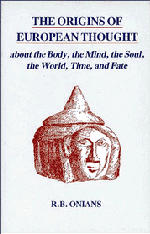Book contents
- Frontmatter
- Contents
- Preface to the first edition
- Preface to the second edition
- Introduction: The Earliest Greeks
- PART I THE MIND AND THE BODY
- PART II THE IMMORTAL SOUL AND THE BODY
- Chapter I The ψυχή
- Chapter II The Genius, Numen, etc.
- Chapter III Anima and Animus
- Chapter IV The Knees
- Chapter V The Strength
- Chapter VI The Stuff of Life
- Chapter VII River-Worship and some Forms of the Life-substance
- Chapter VIII The World: Beginnings of Greek ‘Philosophy’
- Chapter IX Death and Cremation
- Chapter X The Offerings to the Dead and to the Gods
- Chapter XI Nectar and Ambrosia
- PART III FATE AND TIME
- ADDENDA
- Indexes
- Frontmatter
- Contents
- Preface to the first edition
- Preface to the second edition
- Introduction: The Earliest Greeks
- PART I THE MIND AND THE BODY
- PART II THE IMMORTAL SOUL AND THE BODY
- Chapter I The ψυχή
- Chapter II The Genius, Numen, etc.
- Chapter III Anima and Animus
- Chapter IV The Knees
- Chapter V The Strength
- Chapter VI The Stuff of Life
- Chapter VII River-Worship and some Forms of the Life-substance
- Chapter VIII The World: Beginnings of Greek ‘Philosophy’
- Chapter IX Death and Cremation
- Chapter X The Offerings to the Dead and to the Gods
- Chapter XI Nectar and Ambrosia
- PART III FATE AND TIME
- ADDENDA
- Indexes
Summary
The ψυχή is currently explained as the ‘breath-soul’. It is thought to be the breath-soul because ψύχω means ‘I blow’. The fact that in one passage the ψυχή is governed by ἀπὸ… ἐκάπυσσε and that when disembodied it is described as disappearing beneath the earth ‘like smoke’, ἠΰτε καπνός, is not conclusive; because the mouth is the natural passage to and from the interior of the body and any kind of ‘soul’ might well be conceived as thus gaseously insubstantial though visible. If our view of θυμός as the ‘breath-soul’ is correct, in favour of the same meaning for ψυχή and its equivalence to θυμός, though not decisive, are the descriptions of Andromache's swoon already quoted: ‘she breathed forth (ἀπὸ…ἐκάπυσσε) her ψυχή… (seven lines) …but when she breathed again (ἄμπνυτο) and the θυμός was gathered into her ϕρήνʾ; of Sarpedon's: ‘his ψυχή left him and mist o'erspread his eyes, then he breathed again and the breath of Boreas around him revived him, breathing upon him who had grievously breathed forth (κεκαϕηότα) his θυμόςʾ; and Nestor's plea that if Peleus heard that the Achaeans were cowering before Hector, he would pray ‘that his θυμός might pass from his limbs into the house of Hades’, which the ψυχή is commonly said to do.
- Type
- Chapter
- Information
- The Origins of European ThoughtAbout the Body, the Mind, the Soul, the World, Time and Fate, pp. 93 - 122Publisher: Cambridge University PressPrint publication year: 1988



